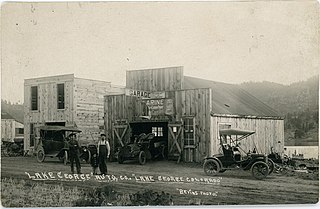
Telematics is an interdisciplinary field encompassing telecommunications, vehicular technologies, electrical engineering, and computer science. Telematics can involve any of the following:

Used goods, also known as secondhand goods, are any item of personal property offered for sale not as new, including metals in any form except coins that are legal tender, but excluding books, magazines, and postage stamps. Used goods may also be handed down, especially among family or close friends, as a hand-me-down.

An aerial work platform (AWP), also known as an aerial device, elevating work platform (EWP), aerial lift, cherry picker, bucket truck or mobile elevating work platform (MEWP) is a mechanical device used to provide temporary access for people or equipment to inaccessible areas, usually at height. There are distinct types of mechanized access platforms and the individual types may also be known as a "cherry picker", "boom lift" or "scissor lift".
Enterprise Rent-A-Car is an American car rental agency headquartered in Clayton, Missouri, in Greater St. Louis. Enterprise is the flagship brand of Enterprise Holdings, which also owns other agencies including Alamo Rent a Car and National Car Rental. The company has historically concentrated on what it calls "home city" rentals, often people renting a car while their own was being repaired, but has expanded to airport-based rentals, especially after its parent company's acquisition of Alamo and National in 2007.

ComfortDelGro Corporation Limited, commonly known as ComfortDelGro, is a multi-national transport group based in Singapore. It is listed on the Singapore Exchange that operates more than 40,000 vehicles across 12 countries. It was formed on 29 March 2003 through a merger of Singaporean land transport companies Comfort Group and DelGro Corporation.

Penske Truck Leasing Co., L.P. is a joint venture of Penske Corporation, Penske Automotive Group, and Mitsui & Co. Headquartered in Reading, Pennsylvania, the company was founded by Team Penske owner Roger Penske on December 1, 1969. It is Penske’s flagship and best known division. The firm serves customers in North America, South America, Europe, Asia, and Australia; among its services are full-service commercial truck leasing, truck fleet maintenance, truck rentals, and used truck sales. The company currently employs more than 40,000 workers worldwide and operates and maintains a fleet of more than 450,000 vehicles. Brian Hard is the president and CEO of the company.
U-Haul Holding Company is an American moving truck, trailer, and self-storage rental company, based in Phoenix, Arizona, that has been in operation since 1945. The company was founded by Leonard Shoen and Anna Mary Carty in Ridgefield, Washington, who began it in a garage owned by Carty's family, and expanded it through franchising with gas stations.

A vacation rental is the renting out of a furnished apartment, house, or professionally managed resort-condominium complex on a temporary basis to tourists as an alternative to a hotel. The term vacation rental is mainly used in the US. Other terms used are self-catering rental, holiday home, holiday let, cottage holiday and gite.
Field service management (FSM) refers to the management of a company's resources employed at or en route to the property of clients, rather than on company property. Examples include locating vehicles, managing worker activity, scheduling and dispatching work, ensuring driver safety, and integrating the management of such activities with inventory, billing, accounting, and other back-office systems. FSM most commonly refers to companies that need to manage installation, service, or repairs of systems or equipment. It can also refer to software and cloud-based platforms that aid in field service management.

An automobile repair shop is an establishment where automobiles are repaired by auto mechanics and technicians. The customer interface is typically a service advisor, traditionally called a service writer.
A car rental, hire car or car hire agency is a company that rents automobiles for short periods of time to the public, generally ranging from a few hours to a few weeks. It is often organized with numerous local branches, and primarily located near airports or busy city areas and often complemented by a website allowing online reservations.
United Rentals, Inc is an American equipment rental company, with about 16 percent of the North American market share as of 2022. It owns the largest rental fleet in the world with approximately 4,700 classes of equipment totaling about $19.3 billion in original equipment cost (OEC) as of 2022. The company has a combined total of 1,625 locations, including an integrated network of 1,504 rental locations in North America, 38 in Europe, 23 in Australia and 19 in New Zealand. In North America, the company operates in 49 U.S. states and Puerto Rico and in every Canadian province. In 2017, United Rentals' revenue totaled more than $6.64 billion, with over $1.35 billion in profit. It is ranked #424 on the Fortune 500, #1183 on the Forbes Global 2000 list of the world's largest public companies, and is the world's largest equipment rental company.
Leaseback, short for "sale-and-leaseback", is a financial transaction in which one sells an asset and leases it back for the long term; therefore, one continues to be able to use the asset but no longer owns it. The transaction is generally done for fixed assets, notably real estate, as well as for durable and capital goods such as airplanes and trains. The concept can also be applied by national governments to territorial assets; prior to the Falklands War, the government of the United Kingdom proposed a leaseback arrangement whereby the Falklands Islands would be transferred to Argentina, with a 99-year leaseback period, and a similar arrangement, also for 99 years, had been in place prior to the handover of Hong Kong to mainland China. Leaseback arrangements are usually employed because they confer financing, accounting or taxation benefits.
The rental industry spans many different types of equipment from tools to heavy construction equipment, aerial to vehicles, party and event to computers and test and measurement equipment and highly specialized areas such as Crane and Temporary Accommodation rental. In the UK and some parts of Europe it is referred to as the Hire Industry.
Specialized Mobile Radio (SMR) may be an analog or digital trunked two-way radio system, operated by a service in the VHF, 220, UHF, 700, 800 or 900 MHz bands. Some systems with advanced features are referred to as an Enhanced Specialized Mobile Radio (ESMR). Specialized Mobile Radio is a term defined in US Federal Communications Commission (FCC) regulations. The term is of US regulatory origin but may be used in other regions to describe similar commercial systems which offer a radio communications service to businesses.

Nextel Communications, Inc. was an American wireless service operator that merged with and ceased to exist as a subsidiary of Sprint Corporation, which would later be bought by T-Mobile US and folded into that company. Nextel in Brazil, and formerly in Argentina, Chile, Peru, the Philippines, and Mexico, is part of NII Holdings, a stand-alone, publicly traded company not owned by Sprint Corporation.
Operated Equipment Rental is the term used for the rental of large or complex machinery where the rental company supplies an operator or driver to operate the machinery. This is also sometimes referred to as Wet Rental, and Operated Plant. In India, the Middle East and Asia a large percentage of all heavy equipment and cranes are supplied with operator reflecting the comparative youth of training programs for specialized operators in construction companies in those countries.

Result Group sold a specialist equipment management software application: rentalresult to companies renting and managing assets, e.g., cranes, tools, heavy equipment, aerial, modular space, computer hardware and test & measuring equipment since 1994. It was privately owned and incorporated in Delaware and the United Kingdom. The company was acquired by Wynne Systems Inc of Irvine, CA in December 2015 and the RentalResult product continues as a brand under the Wynne umbrella.

A scooter-sharing system is a shared transport service in which electric motorized scooters are made available to use for short-term rentals. E-scooters are typically "dockless", meaning that they do not have a fixed home location and are dropped off and picked up from certain locations in the service area.

Indie Campers is a motorhome rental company, operating in the Europe, North America and Oceania, with its own fleet of over 7000 vehicles distributed by more than 70 locations in Portugal, Spain, France, Italy, Germany, Netherlands, Croatia, United Kingdom, Belgium, Switzerland, Republic of Ireland, Sweden, Austria, Iceland, Denmark, Norway, Canada, Australia, New Zealand and in the United States. In addition to its own fleet, Indie Campers has a campervan Marketplace with more than 2000 vehicles from private hosts.











